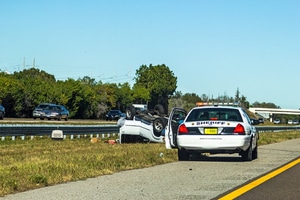
Police officers, firefighters, paramedics, and construction workers put their lives in danger every time they respond to a crash or are otherwise working on the highway. The possibility of being hit by a car or truck is high and causes many people to lose their lives each year. To prevent fatal accidents, Texas has the Move Over law.
We want to help you too.
Submit the short form below to get a free case review.
What Does the Move Over Law in Texas Entail?
Whether emergency personnel are stopped on the road to help a stranded driver, assisting in a car accident, or stopping a vehicle for a violation, they often work closely to high-speed lanes. The Texas Move Over or Slow Down law requires motorists to yield to emergency vehicles on the road so they stay safe.
Drivers in Texas must yield to the following emergency vehicles under the Move Over or Slow Down law:
- Law enforcement
- Firefighters
- Ambulances
- Emergency vehicles
- TxDOT vehicles with flashing lights
The law requires that drivers move out of the lane closest to the emergency vehicle. If that’s not possible, they should reduce their speed to 20 mph below the posted speed limit.
What Are the Penalties for Violating the Move Over Law?
Any driver who ignores or fails to obey the Move Over law in Texas can be fined up to $2,000. There is also a point system for driver’s licenses in Texas. If you violate the Move Over law, you may not only face fines but also points assessed against your driver’s license under the Texas Administrative Code. If you receive a certain number of points on your Texas driver’s license, your driving privileges may become suspended. After any points are assessed against your driver’s license, your auto insurance rate will go up significantly.
What Should I Do if My Car Breaks Down on a Texas Highway?
When there is a breakdown or an emergency vehicle on the highway shoulder, other drivers must move over to avoid an accident. Unfortunately, many drivers are distracted behind the wheel. In some horrific cases, other vehicles crash into disabled vehicles or emergency personnel on the highway, causing severe injuries and property damage.
If you’re stopping because the police have pulled you over, be sure to follow the instructions they provide. Follow the steps below if your car breaks down on the highway for any other reason:
- Immediately put your hazard lights on when you notice something is wrong
- Pull over to the side of the road as far onto the shoulder as possible
- Do not exit your vehicle until it’s safe to do so
- Call roadside assistance or the police for help
- Keep your seatbelt on while waiting inside your car
Often, car accidents occur in poor weather or at night. Always be extra vigilant when driving in these conditions and be alert for disabled vehicles on the shoulder. If you’re the one stranded, don’t waste time contacting the police or roadside assistance so you can swiftly be out of harm’s way.
Talk to an Experienced Houston Car Accident Attorney
Car accidents resulting from drivers who fail to move over or slow down on the highway can cause catastrophic injuries and damages. If you’ve been seriously hurt in a collision, you may be entitled to compensation for your injuries, property damage, lost wages, and more.
The team of dedicated car accident attorneys at Sutliff & Stout are available to discuss your car accident and counsel you on the best way to proceed. You and your family deserve the best, and our primary goal is to help our clients secure fair compensation to help on the road to recovery. To speak with an experienced car accident attorney about your car accident, call (713) 987-7111 for a free consultation or complete a contact form.
- Are There Different Types of Motorcycle Licenses in Texas? - November 8, 2023
- Legal Age for Child to Ride on Back of Motorcycle in Texas - October 13, 2023
- Can Motorcycles Ride on the Shoulder in Texas? - October 13, 2023


